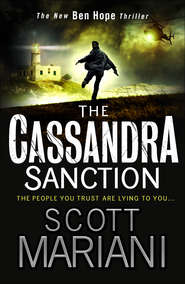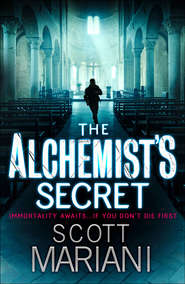По всем вопросам обращайтесь на: info@litportal.ru
(©) 2003-2024.
✖
The Armada Legacy
Автор
Год написания книги
2019
Настройки чтения
Размер шрифта
Высота строк
Поля
Then it was time to refresh Amal’s memory, Ben thought. He headed for the doorway. The woman at reception threw him another glance, but nobody tried to stop him. The doors glided open. Ben walked through, Amal followed, and they found themselves inside a vast room, empty except for the stacks of tables and velvet-backed chairs that lined the far wall.
‘This is it,’ Amal said, gazing around, slowly remembering. ‘At least, I think it is. It all looks so different.’
‘Is it or isn’t it?’ Ben said testily. Impatience flared up inside him for a moment, then subsided as he told himself to go easy. Amal was just as upset as he was.
‘It is, definitely. But they’ve cleared everything away. It’s weird, as if none of these things had happened. Shouldn’t the police have made them keep the place the way it was? For evidence, or whatever?’
‘Hanratty,’ Ben grunted. ‘Never mind him for now.’
‘It’s coming back to me,’ Amal muttered, narrowing his eyes to slits and cocking his head to one side as though that would help him visualise the scene more clearly. He turned to motion at a large expanse of empty floor in the corner nearest the door. ‘That’s where the bar was.’ He grimaced as if to say, the less said about that the better. ‘Over there was a curtain, with all the exhibits and stuff behind it. To the left of it was the stage, with a speaking podium and a big screen. That’s where Forsyte and that other guy gave their speeches.’
‘What other guy was that?’
‘One of the company employees. I only got a quick glimpse of him when I turned round at some point to see where Brooke was.’
‘This is while you were sitting at the bar?’
Amal sighed and nodded.
‘With your back to the room.’
Amal sighed and nodded again. ‘I remember … I remember that he was a younger guy than Forsyte. Quite small, sandy hair. Forsyte introduced him as … as some kind of manager. Dive team manager, something like that. His name was … I don’t know. Baxter? Baker?’
‘Butler,’ Ben said, remembering the name from the Neptune Marine Exploration website. ‘Simon Butler. But I’m not so interested in him right now. Take a minute, look around and see if anything else jogs your memory. Anything at all that might have seemed unusual at the time, or maybe has struck you since as odd. Anyone hanging around Forsyte, for example, or acting out of the ordinary.’ As he said it, he was painfully aware that the kind of things a trained eye could pick out would go quite unnoticed by an ordinary observer. Especially one who’d made a point of hitting the bar.
Amal looked anxiously around him for a few moments. ‘I don’t know. The place was full of people. Journalists firing questions, photographers everywhere. I’ve never been to anything like that before. I wouldn’t know what was strange and what wasn’t. Anyway,’ he admitted miserably, ‘I wasn’t even paying a lot of attention. I was too busy drowning my pathetic little sorrows in bloody gin and tonic. And Brooke – poor Brooke – what’s happened to her? It’s all my fault …’ He ran quaking fingers through his hair, dug the balls of his thumbs into his eyes. His breathing was ragged, as though he was about to burst into tears.
‘Nobody’s blaming you,’ Ben said. ‘Lay that idea aside. Get a grip, Amal. You’re no use to me otherwise.’ He was conscious of the harshness in his tone. In a softer voice he asked, ‘You want to go into the lounge bar for a drink? You look like you could use one.’
Amal shook his head vigorously. ‘No way. Never again. I swear.’
Ben fought back his own desire to drain the place dry of every drop of liquor they had. Anything to slow his mind down, dull the thoughts that kept spinning round and round inside his head, threatening to drive him crazy. ‘All right,’ he said, taking the BMW key from his pocket. ‘Let’s get out of here.’
‘Are we going back to the guesthouse?’ Amal asked as they headed outside towards the car.
Ben’s jaw tightened. He wanted, needed, to keep moving. ‘Not yet.’ He bleeped the central locking open and slid behind the wheel. ‘There are some people I’d like to talk to.’
‘People?’
‘At Carrick Manor.’
‘But how do we find the place?’
‘There’s something called Google Maps nowadays. I thought you writers knew these things.’
‘I’m not really that kind of … never mind.’ Amal closed his door and Ben fired the car up again.
They were three or four miles from Castlebane Country Club and speeding inland when Ben’s phone buzzed in his pocket. He dug it out urgently and answered without slackening his pressure on the gas. ‘Thanks for calling back, Mike.’
‘No problem, mate,’ said the raspy voice on the other end. ‘Gather you’ve got a bit of trouble. Sorry to hear it. Anyway, I’ve dug up the info you asked for. Not a word to anyone, mind, or it’s my arse. It’s only because it’s you.’
‘Appreciated,’ Ben said. ‘Fire away.’
‘All right. Neptune Marine Exploration took out a comprehensive K&R policy four years ago with Rochester and Saunders. Apparently they’d had a near miss with Somali pirates in the Gulf of Aden while hauling up some shipwreck or other, and got jumpy in case they were less lucky the next time. Deal was brokered by that greedy bastard Ronnie Galloway.’
‘I don’t know him. What’s the coverage?’
‘Twelve million. That’s pretty much all I can tell you.’
‘It’s plenty. I owe you one, Mike.’
‘Or two. Good luck, mate.’
Ben ended the call. He knew the name Rochester and Saunders well. Operating from a glittering glass tower in central London, they were one of the top players in their field and provided kidnap and ransom insurance services to high-risk corporate employees, VIPs and other potential kidnap targets all over the globe.
As Ben had known all too well for too many years, kidnap and ransom was a booming industry, not just for those who did it but also for those who could claim to offer protection from it. Long before he’d given up active field work to move to France and set up Le Val, he’d now and then been hired as a freelance negotiator by the insurance companies, to maintain contact with kidnappers, obtain the crucial proof of life, smooth along the negotiations and do everything humanly possible to ensure the early release, unharmed, of the hostages.
Occasionally, other ways and means – more or less peaceable, more or less legitimate – became necessary to get them out. In those cases, the insurance companies were no longer involved. Nobody was, not officially. Those contingencies, and the direct action needed to resolve them, had been Ben’s particular area of expertise.
A lot of K&R operatives had come from a military background – some, like Ben, from 22 SAS and other Special Forces units; Mike Starkey had been a twenty-year veteran of the London Met before switching careers. Many of the guys knew each other well, and because their work tended to take them to the world’s concentrated kidnap and ransom hotspots, their paths often crossed, frequently in the seedier bars and nightclubs where criminal informants and other undesirables tended to hang out. Theirs was a strange, closed and often clandestine community, made more so by the fact that in some countries getting paid to help secure the release of kidnap victims was considered tantamount to profiting from the kidnap itself. Some negotiators burned out from the stress, some ended up on the wrong side of the rails completely, or dead, or kidnap targets themselves. Some simply got tired of the life and ended up behind a desk.
Mike Starkey had been one of those. Nowadays he filled a cushy, safe little niche as a broker in London, the world’s K&R capital, acting as middleman between the clients desperate for kidnap protection insurance and the underwriters who collectively raked in over £150 million a year in return and were extremely reluctant ever, ever to part with a penny of it in the not-uncommon event of a claim. Business was soaring year on year and guys like Starkey were happily surfing the wave.
Some critics partly blamed the meteoric rise in the popularity of K&R insurance for the terrifying worldwide growth of the trade in human misery, on the grounds that the insurers were only fuelling potential kidnappers with greater financial incentives than they’d ever enjoyed before. It was a point of view Ben privately couldn’t disagree with.
‘Was that the call you were expecting?’ Amal asked as Ben put the phone away.
Ben nodded. ‘A contact in London.’
Amal waited for more, and when it wasn’t forthcoming he said, ‘Are you always this talkative and open with people?’
‘Yup, I’m a regular chatterbox,’ Ben said, and drove faster.
Chapter Eleven (#ulink_f1527dca-2dee-5ece-9b69-0f020560173a)
It was 8.27 p.m. when Ben and Amal rolled up on the crunching gravel outside Carrick Manor. The huge, imposing house was sequestered in its own sweeping grounds at the end of a long private road. A golden glow of light illuminated the entrance and the cluster of vehicles parked outside it.
As Ben stepped out of the BMW he noticed the same unmarked Garda Vauxhall Vectra that had been at the crime scene earlier that evening. He brushed his fingers along the bonnet as he walked by and felt the warmth from the still-ticking engine.
‘Hanratty,’ he said to Amal.
‘I’d a feeling we hadn’t seen the last of him,’ Amal groaned.
The manor house’s front door wasn’t locked and the huge entrance hall was empty. Ben paused, listening. From an open doorway at the far end of the hall came the distant sound of voices. Crossing the hall, he followed the sound down a long corridor, Amal tagging along behind him. The sound of voices grew louder and finally led them to another door. Ben peered in.
It was a dining room, or had been before it had been turned into a makeshift operations room by the crowd of police personnel and the fifteen or so other people inside. The room was uncomfortably warm and smelled of stale coffee, sweat and fear. The atmosphere was fraught. Everyone was too busy pacing up and down, looking extremely nervous or shouting at one another to notice Ben slip through the door, followed by Amal.
At the centre of the hubbub was a telephone, sitting silently on the gleaming surface of the long dining room table under the fixed eye of half a dozen men and women in suits.











